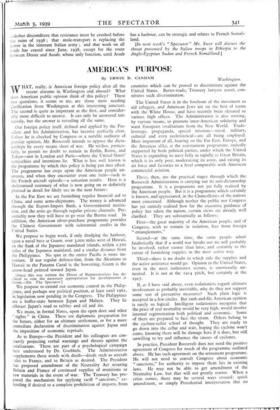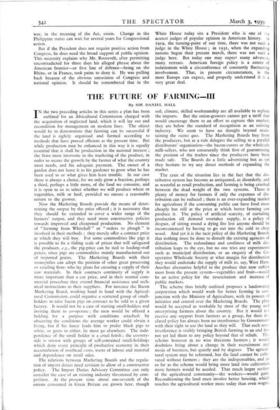AMERICA'S PURPOSE
By ERWIN D. CANHAM Washington.
WHAT, really, is American foreign policy after all the recent alarums in Washington and abroad? What does American public opinion think of this policy? These two questions, it seems to me, are those most needing clarification from Washington at this interesting juncture. The second is quite as important as the first, and consider- ably more difficult to answer. It can only be answered ten- tatively, but the answer is revealing all the same.
Our foreign policy itself, defined and applied by the Pre- sident and his Administration, has become perfectly clear. Unless he is checked by Congress or a notable outburst of popular opinion, Mr. Roosevelt intends to oppose the dicta- torships by every means short of war. He wishes, particu- larly, to permit no doubt to remain in Berlin, Rome, and Tokyo—nor in London and Paris—where the United States' sympathies and intentions lie. What is less well known is the programme by which this policy is being put into effect. The programme has crept upon the American people un- awares, and when they encounter even one item—such as the French aircraft episode—a sensation results. Here is a skeletonised summary of what is now going on or definitely planned in detail for likely use in the near future: In the Far East we are furnishing regular financial aid to China, and some arms-shipments. The money is advanced through the Export-Import Bank, a Governmental institu- tion, and the arms go through regular private channels. Pre- sumably now they will have to go over the Burma road. In addition, the American silver-purchase programme provides the Chinese Government with substantial credits in the United States.
We propose to begin work, if only dredging the harbour, upon a naval base at Guam, over 3,000 miles west of Hawaii, on the flank of the Japanese mandated islands, within 1,500 miles of the Japanese mainland, and a similar distance from the Philippines. No spot in the entire Pacific is more im- portant. If our regular defence-line, from the Aleutians to Hawaii to the Panama Canal is the bowstring, Guam is the arrow-head pointed toward Japan.
[Since this was written the House of Representatives has de- clined to vote the necessary appropriation for developments at Guam.—En. The Spectator.]
We propose to extend our economic control in the Philip- pines, and perhaps our political position, at least until 1961, in legislation now pending in the Congress. The Philippines are a buffer-state between Japan and Malaya. They lie athwart Japan's road to rubber and oil and tin.
We insist, in formal Notes, upon the open door and other " rights " in China. These are diplomatic preparation for the future, either for an ultimate settlement, or for a more immediate declaration of discrimination against Japan and the imposition of economic reprisals.
As to Europe—the President and his colleagues are con- stantly projecting verbal warnings and thrusts against the totalitarians. These are part of a psychological campaign best understood by Dr. Goebbels. The Administration supplements these words with deeds—deeds such as aircraft sales to France, and to Britain as desired. The President has proposed amendment of the Neutrality Act assuring Britain and France of continued supplies of munitions or raw materials in the event of war. The Treasury has pre- pared the mechanism for applying tariff " sanctions," ex- tending if desired to a complete prohibition of imports, from countries which can be proved to discriminate against the United States. Barter-trade, Treasury lawyers assert, con- stitutes such discrimination.
The United States is in the forefront of the movement to aid refugees, and American Jews are on the best of terms with the White House, and have recently been elevated to various high offices. The Administration is also striving, by various means, to promote inter-American solidarity and warn European totalitarians from the New World. Trade- leverage, propaganda, special missions—naval, military, cultural and even ecclesiastical—are all being employed. Most important of all, bearing on the Far East, Europe, and the Americas alike, is the rearmament programme, unitedly supported by both political parties, under which the United States is expanding its navy fully as rapidly as Great Britain, which is its only peer, modernising its army, and raising its air force and factories to a level comparable with American commercial aviation.
These, then, are the practical stages through which the Roosevelt Administration is carrying out its anti-dictatorship programme. It is a programme not yet fully realised by the American people. But it is a programme which certainly is known, and appreciated, in the Chancelleries of the nations most concerned. Although neither the public nor Congress has yet entirely realised how far the executive guidance of policy has taken the nation, certain views are already well clarified. They are substantially as follows: First—the great majority of the American people, and of Congress, wish to remain in isolation, free from foreign " entanglements."
Second—at the same time, the same people admit fatalistically that if a world war breaks out we will probably be involved, rather sooner than later, and certainly to the extent of furnishing supplies in the most active way.
Third—there is no doubt to which side the supplies and the active assistance would go. Opinion in the United States, even in the most isolationist sectors, is emotionally un- neutral. It is not at the 1914 pitch, but certainly at the 1917.
If, as I have said above, even isolationists regard ultimate involvement as probably inevitable, why do they not support some sort of preventive measures? Such plain logic is accepted in a few circles. But rank-and-file American opinion is rarely so logical. Intelligent isolationists recognise that the price of real neutrality would be very high, would involve internal regimentation both political and economic. Some of them are prepared to face the strain. Others belong to the cyclone-cellar school of thought. They are ready to go down into the cellar and wait, hoping the cyclone won't come, knowing there will be damage here if it does, but still unwilling to try and influence the causes of cyclones.
In practice, President Roosevelt does not need the positive agreement of Congress for much of the programme outlined above. He has such agreement on the armament programme. He will not need to consult Congress about economic " sanctions," for authority to impose them lies in existing laws. He may not be able to get amendment of the Neutrality Law, but that will not greatly matter. When a crisis comes, there may be several ways around: quick amendment, or simply Presidential interpretation that no war, in the meaning of the Act, exists. Change in the Philippine status can wait for several years for Congressional action.
But if the President does not require positive action from Congress, he does need the broad support of public opinion. This necessity explains why Mr. Roosevelt, after permitting uncontradicted for three days hit alleged phrase about the American frontier—or first line of defence—being on the Rhine, or in France, took pains to deny it. He was pulling back because of the obvious uneasiness of Congress and national opinion. It should be remembered that in the White House today sits a President who is one of the acutest judges of popular opinion in American history. In 1919, the turning-point of our time, there was not such a judge in the White House ; in 1931, when the expanding nations began their present march, there was not such a judge here. But today one may expect many advances, many retreats. American foreign policy is a centre of isolationism with a circumference of constantly fluctuating involvement. That, in present circumstances, is the most Europe can expect, and properly understood it is a very great deal.



























































 Previous page
Previous page